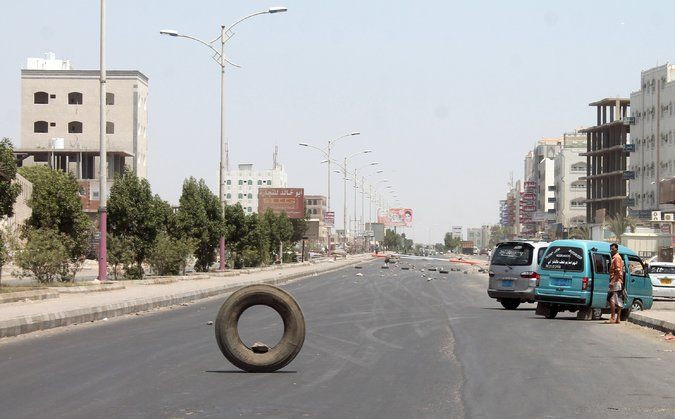Yemen War: No Evacuation Plans For Stranded Americans By US Government

The exodus of foreign diplomats and citizens from war-torn Yemen has surged in recent days amid Saudi-led airstrikes targeting Iranian-backed Houthi militias, who have taken over much of the country. China, India, Pakistan and Somalia have sent ships and planes to evacuate their citizens trapped in Yemen. The United States moved its embassy staff out of Yemen after suspending embassy operations in the capital Sanaa last month, and remaining military personnel were airlifted out last week. But the U.S. government has yet to announce any evacuation plans for Americans in Yemen.
Saudi Arabia’s campaign -- which was coordinated with help from the United States -- has Yemen landlocked, with the airports and major seaports shut down. Yemeni-Americans said they received no warning of the Saudi attack, and now they are desperate for alternate escape routes.
Mokhtar Alkhanshali, a San Francisco native who is currently in Sanaa, said he never received a response from the State Department. “The U.S. coordinated with Saudi on logistics, so they must have been aware of what was coming,” he told Al Jazeera. “And yet we received no warning. If India and Somalia can find a way to evacuate their nationals, why can’t the U.S.?”
The Shiite Houthi rebel group last week issued a call to report individuals suspected of being American or Saudi agents. Alkhanshali told Al Jazeera he’s taken up arms to protect himself and his family at their home in Sanaa, where they’ve learned to keep the lights off and steer clear of windows. “People keep family photos near their bed,” he said. “I’ve come to sleep next to several firearms.”
The U.S. Department of State has urged its citizens for months to leave the Arab country. After shutting down its embassy operations in Yemen and evacuating the remaining military, the State Department said in February that “there are no plans for a U.S. government-sponsored evacuation of U.S. citizens at this time.” The State Department did not immediately return emails and phone calls about its evacuation efforts from International Business Times’ on Monday.
China evacuated more than 600 nationals, most of whom left aboard three naval ships, the state-run Xinhua news agency reported Monday. China also suspended its anti-piracy patrols in the Gulf of Aden. “The Chinese government is highly concerned over the safety of Chinese citizens and institutions in Yemen, and has taken immediate action to pull out Chinese citizens in an orderly fashion,” said Foreign Ministry spokeswoman Hua Chunying, according to the Associated Press.
Somalia began evacuating its nationals on Monday and asked Somali citizens there to contact the consulate to aid the process. “We are calling on our citizens in Yemen to contact Somalia consulate so that they can be evacuated,” Interior Minister Abdirahman Mohamed Odwaa said, according to the Somali Current. Yemen’s location near Somalia has made it a transit country for asylum-seekers and migrants. The Arab country hosts approximately 246,000 registered refugees, 95 percent of whom are Somalis, according to the United Nations High Commissioner for Refugees.
Pakistan sent a jet and naval frigate to evacuate more than 500 of its citizens and diplomatic staff from Yemen on Sunday, Agence France-Presse reported. Some 3,000 Pakistani nationals live in Yemen. Pakistan is a longtime ally of Saudi Arabia but has not yet committed to joining the Saudi-led operation.
Last week, India sent two ships to Yemen to evacuate some 3,500 Indians working in the country, many of whom are nurses from the southwest state of Kerala. The Indian government said those who cannot leave by ship will be driven to Saudi Arabia. “As the airports are closed, the plan is to bring these people in ships to neighboring country of Djibouti and from there they will be brought to India by air,” Chief Minister Oommen Chandy of Kerala state said in a statement Thursday, according to AFP.
Yemen has been a vital U.S. ally in hunting down al Qaeda in the Arabian Peninsula. But the country plunged into chaos this month after the capital was overtaken by a Shiite Houthi rebellion seeking to oust the Sunni government and President Abd-Rabbu Mansour Hadi, who has since fled the country, Reuters reported.
The Yemeni conflict has become part of a regional power struggle between Sunni-ruled Saudi Arabia and Shiite-ruled Iran. But what began as a sectarian divide has now bled into revenge over past oppressions and for geopolitical control.
Arab states charge meddling by Iran, which has financially and militarily backed the Houthis. Saudi Arabia is leading a coalition of more than 10 countries conducting or assisting with strikes against the Houthis and allied militias. Last week, foreign ministers from 22 Arab countries agreed to form a unified military force.
© Copyright IBTimes 2024. All rights reserved.





















